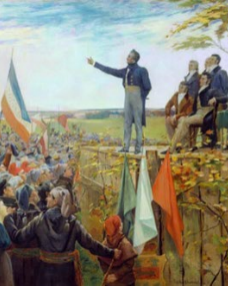Louis-Joseph Papineau was a French-Canadian politician, lawyer and landlord. He is best known as an emblematic figure of French-Canadian nationalism and a key player in the Patriotes rebellion.
During his political career, he served as a Member of Parliament for 28 years and Speaker of the House of Assembly for 22 years. He led the Parti canadien, which later became the Parti patriote. He campaigned for the reform of the Canadian constitution, for ministerial responsibility, for the corruption of civil servants, the governor and the parliamentary system, and for respect for the French language and the Catholic religion.
Louis-Joseph Papineau was a controversial political figure. When Lower Canada received Russell's 10 resolutions, Louis-Joseph Papineau advocated negotiation and non-violence to bring about change. As he loses control of the increasingly stormy rebellions, he prefers not to take part in the battles and leads the party from afar. However, he allows his name to be used to rally the troops. Later, he refused to sign Lower Canada's Declaration of Independence. Nevertheless, when a price was put on his head in 1837, he went into exile in the United States, then France, where he asked the presidents to support Lower Canada's independence. A fervent defender of the Catholic religion, he was nonetheless a deist and anticlerical. Still in exile, he firmly opposed the Act of Union and campaigned for Lower Canada's independence. However, upon his return in 1845, he advocated the annexation of Lower Canada to the United States. He officially left politics in 1854 and retired to his seigneury.


-
1786: Louis-Joseph Papineau is born on October 7, in Montreal.
-
1815: He becomes leader of the Parti canadien (forerunner of the Parti patriote). He fought against the favoritism and abuses of the governor-appointed legislative and executive councils. However, he remained a staunch monarchist.
-
1822: With John Neilson, he travels to London to present a petition of 80,000 names against the union of Upper and Lower Canada.
-
1826: The Parti canadien is renamed the Parti patriote and becomes more radical.
-
1831: He passes a law for the political equality of all citizens. As a result, Jews can now hold public office.
-
1834: Pointing out a legal loophole in the Constitutional Act of 1791, he campaigned against the right of women property owners to vote.
-
1834: He is a member of the committee that drafts the 92 Resolutions. When presented to the House of Assembly on February 17, he delivers a speech convincing elected representatives to send the resolutions to London.
-
1837: Russell's 10 resolutions refuting the 92 Patriote resolutions arrive in Lower Canada on March 6. Louis-Joseph Papineau leads the protest movement.
-
1837: Governor Gosford orders the execution of Patriote leaders, including Louis-Joseph Papineau, on November 16. Papineau remains in exile until 1845.
-
1839: He publishes Histoire de l'insurrection du Canada in rebuttal of Lord Durham's Report.
-
1840: The United Kingdom adopts the Act of Union, uniting Lower and Upper Canada. From then on, Louis-Joseph Papineau supported the annexationist movement, which advocated the annexation of Lower Canada to the United States. In his opinion, this solution would be preferable to the union of Canada's two provinces.
-
1871: He dies on September 23, in Montebello.